Interviews 2006
...The award-winning Visions of Heaven and Hell exhibition continued in Los Angeles as the year opened, with Clive creating an
online personal video tour for anyone who couldn't make it in person. In the meantime, Clive's
studio filled with new works as he began work on a series of designs for Abaratian tarot cards. Having painted much of the
artwork for Abarat Books three and four, Clive decided to expand the series to five books and continued to write Scarlet Gospels.
With IDW adapting The Great and Secret Show in comic book form, Mick Garris took on the job of adapting Clive's Valerie On the
Stairs treatment for the Masters of Horror series.
Seraphim's film projects continued with progress on Plague, Midnight Meat Train and Pig Blood Blues, although the Abarat deal
with Disney was allowed to lapse. Summer 2006 brought news of a collaboration with Codemasters to produce a new video
game - Jericho - ahead of Clive's September trip to the UK where he guested at FantasyCon.
On his return to LA, Clive made the surprise announcement that he would be writing the script
for an upcoming remake of Hellraiser with the Weinstein brothers. As the delivery deadline for Scarlet Gospels passed by, it
became clear that Clive would need to spend some months on a further polish and he began, instead, to plot the narrative for
Abarat Three...
Scary Movies: Inside The Horror Genre
Space - Scary Movies: Inside The Horror Genre, 2006
[Re: Hellraiser in 1986] "I was witless with fear. I mean, this is funny now but at the time it was clammy palms, I went  to the local library in Crouch End in London where I lived to get out a book about movie directing and I guess there were a lot of aspirant directors out that week because there weren't any books to be had. I think we had a Monday start and I was sitting there thinking, 'I don't know what I'm doing.'
to the local library in Crouch End in London where I lived to get out a book about movie directing and I guess there were a lot of aspirant directors out that week because there weren't any books to be had. I think we had a Monday start and I was sitting there thinking, 'I don't know what I'm doing.'
"And I remember Orson Welles had said, 'Everything I needed to learn about movie-making, I learned in a weekend,' and so I'd thought, well, I'll give myself the weekend, you know?"

Raising Hell
By Duncan Bell, Bizarre, No 106, January 2006
"I think there is a huge fascination with death and the rituals surrounding it that'll never fade. The terrific unpredictability of death - the fact that you can be walking along the road perfectly happily and then something could fall on you. I don't believe people can ever get used to that or become deadened to it. Especially with literature, which can get inside people's heads in a way movies can't. I've written from the point of view of the dead, from the point of view of the killer and the killed. It's those kind of things that make books so powerful."
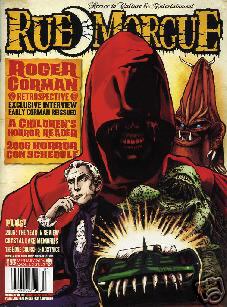
Barker's Brood
By Jovanka Vuckovic, Rue Morgue, No 53, January 2006
"I think people are a little more suspicious of me [as a children's author] than I would want them to be. Inevitably an adult who knows who I am as a writer of adult fiction is going to be looking at a book with my name on it that they intend to take home to their kids, and they may be thinking, 'Wait a second, this is Hellraiser Clive Barker - can a leopard really change its spots?' "
Beautiful Monsters
By Kristin Friedrich, Los Angeles Downtown News.com, 9 January 2006 (note: full text online at www.ladowntownnews.com)
"When you write a script, the process to get that on the screen has so many other people involved. So even though
Hellraiser may be my movie, it's got all kinds of other wonderful people working on it.
"When I write a novel, it's going to take eighteen months of my life and in that time, I change, because eighteen months of
my life pass, and you discharge energies into the book which are no longer part of you. You deliver the book to the publisher,
and a year later, it comes out into the marketplace, people buy it and reviewers comment on it. So though it came out of a
very deep place, that place is by that time very remote. In the case of a painting, six of them didn't exist last week. If you
touched them at the opening, you would have smeared the paint."
Speak No Evil
By Thorn, Instigator Magazine, No 10, 2006
"I recall being present at an autopsy. The embalming was being done strictly behind closed doors - of course I should have not
been doing it, but it was incredibly informative, useful, and amazing. By the things I witnessed, I am admitting the chaos. At the
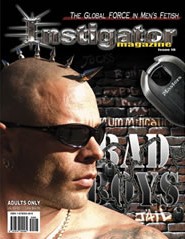 same time as admitting the chaos, a body lies in front of you on the slab, while this guy comes at it with a saw, taking off the top of
the head, and you say, 'Well, its just meat.. .its just meat.' When I eased the brain out and held it. I thought, 'In my hands, cold,
and now totally useless, is a life. Memories of loves and all kinds of things.' And just to pick up the idea of magic, my idea of magic
is rooted in the belief that I don't think those things like memories and love disappear. Does that make sense..?
same time as admitting the chaos, a body lies in front of you on the slab, while this guy comes at it with a saw, taking off the top of
the head, and you say, 'Well, its just meat.. .its just meat.' When I eased the brain out and held it. I thought, 'In my hands, cold,
and now totally useless, is a life. Memories of loves and all kinds of things.' And just to pick up the idea of magic, my idea of magic
is rooted in the belief that I don't think those things like memories and love disappear. Does that make sense..?
"Whatever the gentleman lying on the table in front of me was, in all his complexities, his paradoxes, his self-esteem problems, or
whatever hell else he had, he lived was in that relatively small mass of flesh held in my hands. We are learning through our
own technologies that it is possible to put huge amounts of information into tiny, tiny spaces. We are learning this almost
day on day now. What I feel is that when we get to God, is it will be a one fantastic memory!"
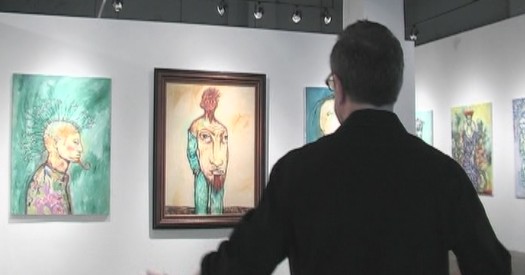
Bert Green Video Tour
By Clive Barker, Bert Green Fine Art, Los Angeles, 26 January 2006 (note: full video footage here)
"Then behind these curtains, actually, really to keep young eyes away are the erotic images from the exhibition. I don't know what to say about these - they come from some deep and very happy place inside me!... This one didn't find a happy home, but I'm kind of glad because I want it back. This one did - interesting - I didn't even know this one had been sold - ha! I kind of had quietly bet myself that would not find a purchaser, but it did, which is great."
Talking Comics With Clive Barker
By Chris Ryall, Newsarama, 3 February 2006 (note: full text online at www.newsarama.com)
"The Art is the place that gets you to where every moment is holy, and every moment is
the same holy moment. That is the past, the present and the future all rolled into one
extraordinary moment. It's the epiphany, the apotheosis. It's the moment you have -
actually, I had lots of them in my early teens, when I began to understand that the
world, all it was a piece. Everything sentient and non-sentient all rolled into one.
The novel is trying to put the pieces together for the people the same way, so they
can have that same experience...
"You know, that idea of you seeing Quiddity three times in your life... this is something
that anyone working in horror - I'm not sure if this could be called horror, but it's
horror-fantasy, or somewhere in between - any writer would love to create some mythology
that exists outside themselves. I think King's The Dark Tower falls into that
category, and certainly Tolkein's work falls into that category. Peter Pan - a lot of
people who know the term 'Peter Pan' don't know who J.M. Barrie is, and I think a lot of
people who know who 'Pinhead' is haven't a clue who Clive Barker is... and I like that.
I think that eventually you achieve a glorious invisibility and what stands in your
place, if you will, is the mythologies you created, the icons you added, people's mental
playgrounds. And if the Art is about anything, it's about mind. It's about mind being a
place where everything is evolved, your memory, your present experience, your hopes for
the future, all make a common 'soup' of sorts, in which fantasy and reality can in turn
be evolved in a common soup. And I'm hoping that the books are a spoonful of that soup."
Comics Tales Great And Secret
By Joe Nazzaro, Fangoria.com, 24 February 2006 (note: full text online at www.fangoria.com)
"When Chris [Ryall] came to me and said he'd really like to do it, he proposed twelve issues, which I thought was great,
because you really can get into plenty of detail. I've seen two issues so far, and the artwork is glorious and very sexy.
Should it be the same as the book? My feeling was, and I said this to Chris in so many words, 'Do what you must do to
make this a fucking fantastic comic!'
"Hopefully, if people take to it, we'll do Everville after that, and then The Third Book of The Art, which is shaping up very
strongly at the back of my mind right now, I think that will be the next really big book I do, having finally said goodbye to
the guy with pins in his head. The third volume of The Art will be the biggest and most encyclopedic of the three. Hopefully,
when it's published, Chris will do an adaptation of that as well, but we may find that it requires twenty-four issues. We'll
be able to bind all three series into a graphic trilogy, and at that time, I'll have the pleasure of being able to have a boxed
set of The Art, which is what we always intended from the beginning. So far, it's been a lovely marriage, with nothing but
support from IDW, which is a very nice feeling."
Abarat. Abarat. Abarat. Abarat... Abarat!
By Phil and Sarah Stokes, 13 and 20 March 2006 (note: full text here)
"I've been doing the public paintings which has been absolutely fantastic - it's just a completely different thing, you know? Are any of
the paintings that I've painted publicly masterpieces? Absolutely not, but I think people have had fun watching and it's been
tremendous fun for me, and I've really enjoyed it and it tied in nicely with the change of priorities where I'm looking at my life with a lot
more painting in it than I thought there was going to be - especially with the fifth book of Abarat. And you know, I spent the weekend - I
wrote a nice hefty chunk of The Scarlet Gospels over the weekend and I painted, and I didn't turn on the television! You know, I went to
bed, I read a little bit and fell asleep with paint all over me! The fact of the matter is those large canvases are buggers and if you're
actually buzzing between - I counted out seventeen canvases on the go right now in the studio - only four or five are 48 x 60" but
nevertheless, moving a bunch of these things around... Painting has become so much more important to me and I've got just so much
that I want to communicate through the word and through the paint and, yes, through the film too, but I'm very happy letting
Kelly Asbury deal with Fox and moving towards making Thief of Always, even if it's a slow progression, it's in the right direction.
Midnight Meat Train we're casting this week, so it's all starting to fall into place for the guys, meanwhile Haeckel's Tale was shot and
Valerie on The Stairs, which is the one I originated for the second [Masters of Horror] series, is about to be shot..
"It was Mick Garris, God bless him, who said it was the first time he'd received a 45-page treatment for a 60-minute teleplay! But it
was a story that I liked and that I wanted to do as a story for a long time and never found the time to do it and I thought, well it's got
lots of visual potential and it's something the guys might like over at Masters of Horror so I took a chance on it, told Mick, 'Please
trust me - I think you're going to like it.' Bless him, he did - I didn't pitch anything to him, I didn't tell him anything about it, he just held
the space open for me."
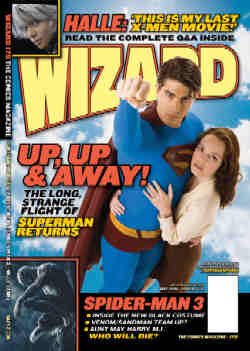
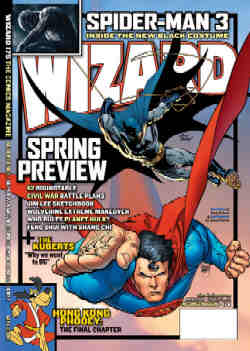
Clive Barker
By Sean T Collins, Wizard, No 175, May 2006
"[The Great And Secret Show] is a book about a big subject. It's a book about secret powers - the things that lie beneath the surface of our lives, the powers that manipulate us, the powers that fight the manipulators. It's the first Book of The Art: The Art is the world-changing, world-building magic that the good and evil entities in the book are fighting to possess. And like in most of my books, it's never entirely clear who the good guys and bad guys are. What we're watching in this book is the battle for possession of this incredible world-changing power. Chris [Ryall] fought hard to make this a twelve-issue run rather than six issues, and I think that's the only way to tell such a huge story. And now that I've seen Gabriel [Rodriguez]'s art, it gets me excited about the story all over again."
Fantasycon 2006 - Barker, Gaiman, Feist And More
By Sandy Auden,
(i) The Alien Online, 1 May 2006 (note: full text online at www.thealienonline.net) (ii) edited version as
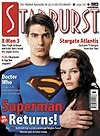 Book News in Starburst, No 337, June 2006
Book News in Starburst, No 337, June 2006
"It's the reconnection part of going and doing a convention in England that I'm looking forward to most. I haven't been over and had the
really laid back connection you can have at a convention, as opposed to the more well regimented feel that you get at a signing where
everybody has only got a couple minutes or less. At a convention you've got a chance to chat to people for longer, and I don't mean
just fellow writers, I mean readers. And now I guess people are looking at the paintings now as well.
"My art book, Visions, is out now but I haven't done any signings for it in England so I'm hoping people will bring copies of the book
along to the convention and I can sketch in them and sign them and so on."
You Called, He Came...
By Phil and Sarah Stokes, 2 and 3 June 2006 (note: full text here)
"I don't think that [Abarat] is just writing for children; I think it's writing. At signings now, the most vociferous fans of Abarat are adult! Just to add a little rider to that, a sort of P.S., there's a certain kind of reader who's taken great pleasure in the fantastic elements of my fiction but has never liked, or never been comfortable with the sexuality of the characters or the freedom with which their sexuality is stated or explored, nor have been pleasured by the intense violence. Abarat, of course, gives them the best of both worlds. They get the fantasy and I think adults are enjoying the paintings as much as the kids are, that's the sense I'm getting anyway... As you will see as Abarat goes on - one of the reasons why I need that fifth book is because I realised how much deeper I was going to need to dig into my feelings about the need for the fantastic in our lives, and I needed that space of the fifth book to be able to do that."
Interview
By Dee Snider, Fangoria Radio, Launch show, 23 June 2006
"For me, the pleasure of writing something like Scarlet Gospels is nobody will censor me; there will be no MPAA looking through
pages of Scarlet Gospels saying, 'You can't do that to a camel..!'
"I'm taking people down to hell, I'm really going as far as I possibly can in terms of the heretical and the dark and the depraved. At no
point in the two and a half years it has taken me so far - I'm not finished - to get the book to this point, at no point have I said, 'I
shouldn't write that', in fact, if that thought rose in my head it would only inspire me to whip myself into further enthusiasm to make
sure that the subject was even more explored. I feel that's part of my job.
"Certainly in this book I've touched upon a few things that scare me, but I'm not sure it's as simple as even scaring people. Scaring
people, the 'boo effect' shall we call it, the jump, the shock, is something that cinema does very well. Books disturb, books
make us uneasy, books put us in some strange state in which we are contributing our own imaginations to the making of these
images, right? In a movie - in your movie, Dee, in one of my movies - we're supplying pretty much everything for the audience: the
images are there, the music is there, the dialogue is of course there, there isn't much for the audience to do except eat its popcorn
and, occasionally if they're seeing a good horror movie, puking into their popcorn...
"[With a book] you become a co-creator and in the case of Scarlet Gospels, it's the creation of Hell. Going back to your initial
question, Dee, 'How much of my fear is in the book?' I'd like to say well, some of it is my fear but a lot of it, I hope, is going to be my
readers' fears. My words are there to encourage the readers' imagination to sort of get into a dreamy state where they can't tell where
their dreams begin and my words end."
Clive Barker: Master Of Horror, The Fantastical, And More
By Christina Radish, MediaBlvd. Magazine, 25 June 2006 (note: full text online at www.mediablvd.com)
"My two primary jobs are at the desk, writing novels, and in the studio, where I'm painting. Everything else, like the movie world, the comic world, the toy world and the game world, are places that I, obviously, have interest, but I'm not going to try and pretend, for one moment, that I can sit down and really adapt my own work into comic book form. I think that would be fairly disastrous, for one thing. I wouldn't know what to throw out. I'd want everything in, and it would be a 90-issue run. I think it's important to have other people around you, who can teach you, or who can simply do the job better, and you can just take the pleasure in picking up the comic every month."
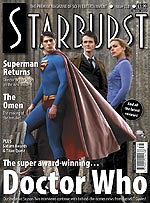
Book News
By Sandy Auden, Starburst, No 338, July 2006
"I'll plunge into writing the third Abarat book immediately after I've finished Scarlet Gospels later this year... Then it's a deep breath for the two huge concluding Abarat books. You know, I was getting into bed last night thinking, 'Boy, you don't half take on some bloody big things sometimes Barker!' But I guess that's what keeps me excited, the challenges in front of me are relatively new to me. And the third book of the series will go into territories of metaphysics and physics that I've never been in before."
Weird Fantasy
By Joe Nazzaro, Starburst, Special No 76, July 2006
"I think the discipline of writing is a demanding life, because it's solitary and you are self-disciplined, and that's the hardest kind of
discipline. On the other hand, when I know I've got a scene that I'm looking forward to, I'm out of bed as fast as I can get
 there still. I'm 53 now, and if you include the plays, I suppose I've been writing for 30 years now, but I still haven't lost the taste
that I get in my mouth, which is the excitement of a scene that is going to appear on the page in front of me. Why do I say
'taste'? I don't know, but that's how it feels. I can 'taste' the work.
there still. I'm 53 now, and if you include the plays, I suppose I've been writing for 30 years now, but I still haven't lost the taste
that I get in my mouth, which is the excitement of a scene that is going to appear on the page in front of me. Why do I say
'taste'? I don't know, but that's how it feels. I can 'taste' the work.
"It's weird, but I have a view out across the canyon and I almost never look at it. I have my parrot behind me and once in a
while, she demands attention by getting down off her perch and wandering over the floor and pulling on my jeans and saying,
'Come play!' but most of the time my nose is to the paper."
Barker Hears Call, Creates 'Jericho' Game
By Chris Marlowe, (i) Hollywood Reporter, 18 July 2006 (note: full text online at www.hollywoodreporter.com), (ii) Reuters (as Horror Veteran Barker Game For 'Jericho' Thriller), 18 July 2006 (note: full text online at www.reuters.com)
"There are things in my imagination which I think can only be paintings, things that can only be books, and this thing [Clive Barker's Jericho] has to be a game... Is there a movie in it later? Sure. But what it has to be is what it's going to be first, an absolutely killer game."
Major New Blast From Clive Barker's Canon Of Nightmares To Appear As Supernatural Horror Video Game
By [ ], Press Release, Codemasters, 19 July 2006
"It's incredible when a company as admired as Codemasters embraces your vision the way they have embraced Jericho. This project
is very close to my heart and I don't believe there's ever been anything like it. It promises to be the most spectacular, creative, and
unflinching realization of a Clive Barker nightmare that will drag players in kicking and screaming.
"Players will constantly be given new challenges, new environments, and yes, new horrors and abominations to face every step of the
way... However, unlike a conventional game in which the characters are attempting to escape at the end of their ride through Hell, our
protagonists have a much more difficult task. The closer they come to the end of their trek into darkness, the nearer they get to the
source of that darkness: Evil Incarnate, we'll call it for now..."

The Plague: The Young And The Merciless
By Carnell, Fangoria, No 256, September 2006
"[The Plague]'s a very different style of horror, I'm not sure in the strictest sense it even is horror. My style is usually a bit more graphic,
but there is definitely an audience out there for this type of film, as we've seen with a lot of Japanese movies. They really don't want anything too
extreme. This feels more like it belongs to that subgenre of being disturbing and unsettling and beautifully performed. I'm more tempted to want
to call this film 'creepy' rather than [outright] 'horror'.
"What's harder to judge [than a 'boo' movie] is a movie that's designed to simply be disturbing. Is it really working? It's hard to say, because the
audience isn't going to be aware of how potent a picture is until three days later, when they realise they're still thinking about it."
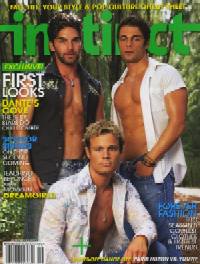
The Waking Dream
By Terrance Griep, Instinct, Vol 9 No 9, September 2006
"If you put Hellraiser next to Weaveworld next to Imajica next to Abarat, you've got four completely different things. Some of my imagination works along hellish lines and some of it doesn't. My paintings go from erotic to phantasmagoric to what you might call 'horror'... I come at creation with images, even when I'm not painting them. I dreamed Pinhead. And there's Weaveworld, a world woven into a carpet. It's a visual idea: an easy jumping off point."
Sowing The Seeds Of The Story Tree
By Phil and Sarah Stokes, 28 August and 4 September 2006 (note - full text here)
"Abarat will be a movie but I am fighting very hard for them not to try making it too soon. We are no longer making Abarat with
Disney, that is now official, the work is back in my hands and my ownership, I owe them nothing. I suppose you could say
there were creative differences, I don't know. Certainly the way they wanted to do it was not the way I wanted to do it. I realised a
short while after getting into the deal with Disney and I'm glad it's come to this conclusion where we can make this movie...
"My thing to the filmmakers is, 'Wait until I've written Book 5 and I've delivered everything and then make your movie.' The reason I say
that is because Candy doesn't age significantly - she ages maybe three years across the five books and if you're going to do this
properly then the actress can't age overmuch either and you've got to have all the books written and all the screenplays written
before you start."
Interview
By Simon Mayo, BBC Radio Five Live, 19 September 2006 (note - download and podcast available here)
"[The Abarat / Disney deal] - It doesn't happen anymore - I said good bye to them. I wasn't too excited and it was a 'thank you
and goodnight' sort of thing. I actually parted company with them... What do they say, 'creative differences'? Is that the phrase?...
"It just wasn't going to work, it wasn't going to happen the way I felt it should. And a lot of the people that I actually did the deal with,
the guys that I sort of began the whole process with have actually left Disney since I signed the deal, and you know, you're not
making a movie with a company, you're making it with individuals and if those individuals are gone a corporation means nothing...
"Well, there's a lot of truth in the observation that monopoly capitalism is going to turn out to be a massive villain as these
books go on; I mean much larger than has even been winked at yet, and so yes, there is complete validity in that. Now, does
that mean that Disney would say, OK, I don't want to do this book with Barker because he's a critic of capitalism? - I think if they
felt they could make a buck from it it wouldn't bother them too much!"
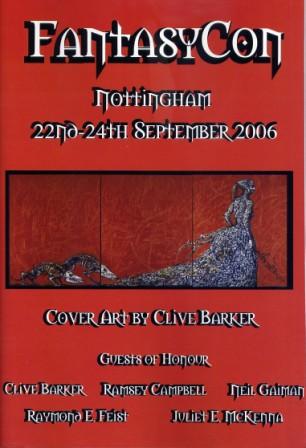
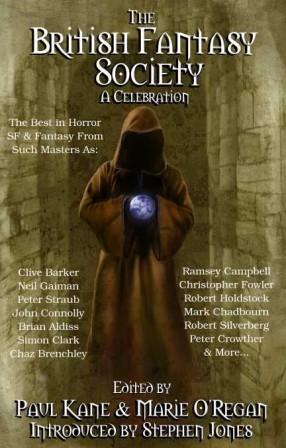
Lord Of Art, Master Of Illusions
By Paul Kane, (i) FantasyCon brochure, 22-24 September, 2006 (ii) excerpted in The BFS: A Celebration, 2006 (note: full text online at www.shadow-writer.co.uk) (interview took place 10 May 2006)
"I know where the book [Scarlet Gospels] is. At any given time I know where the book is. I know what problems there are, where I've got to go next and how I've got to get there. And if I don't know how I'm going to get there I know that my problem between now and tomorrow morning when I put the book down tonight, which will be perhaps six o'clock at night to go painting, and by 8:39 the following morning when I pick it up again I need to have solved a problem related to geography, or a problem related to motivation before I pick up the pen again. You can't dither, it's a quarter of a million words - you can't be insecure. You just have to trust in your own madness...I like that phrase actually. I've never thought of that before, you've dragged that out of me... It's quite quotable. Barker trusts in his own madness. It's so horribly true, Paul, that's the thing. It's all true..."
Scriptwriting Panel
Moderated by Stephen Gallagher, FantasyCon, Nottingham, 23 September 2006
"Getting a movie made is a little like moving through this hotel - there are dark, gloomy, dank places where you don't want to go, where things will get lost forever that are important to you and there are some things that look like shining paths and may lead to somewhere of comfort but are illusions - help me guys! - occasionally you come upon a room where people are laughing, like this, occasionally you'll find somebody like Neil Gaiman sitting on his own. Talking..! It's a labyrinth and the chance of coming out of this complicated pathway with even half of your dream intact is very slight and that's why I've been re-jiggling my head, as it were, and focussing more clearly on the things I really can control."

Guest Of Honour Interview
By Paul Kane, FantasyCon, Nottingham, 23 September 2006
"It was amazing [to see my work in print] - you can ask people in this room who've had this feeling - there's always that 'pinch me'
sense and also the sense that you're getting to people who don't know you, who don't know who you are, how your head works and
are now getting these images, these dreams in their heads. And you know over the years I've since become friends with a lot of
those people and that's tremendous too; it's a very fulfilling feeling.
"I've had in my life two moments when I thought well, if I die now, it's OK. And one was when the first Books of Blood came through
the door, printed - misprinted! - and then when, after a long period of sweat and struggle, Imajica was published and again it
came through the door. I hope I'll feel the same kind of sense of completion, and I think we're always looking - I don't know, maybe
we're not, maybe this is just me - I'm always looking for a sense of how can I ever feel that a job is done and finished and I can
breathe and breathe out and relax and step away. It always feels to me as though there's an energy in me which is pulling me back
to the desk, even the moment after I finish a book. But there are these lovely moments - and I hope to feel the same thing when I
deliver the Fifth Book of Abarat - which hopefully will give me that sense of completion: it'll be alright to drop a house on me if you
wanted to now, and then the moment passes and you go back to your desk..."
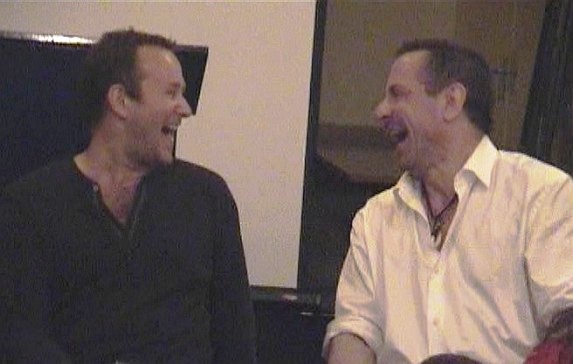
Clive Barker And Simon Bamford Q&A
Moderated by Paul Kane, Informal Q&A Session, FantasyCon, Nottingham, 23 September 2006
"There comes a point in a painting - you know this - in any work, where if you do too much more to it, if you fiddle with it anymore
it's just going to get worse, it's not going to get any better. It may not be the greatest work of art you ever could make, that ever
existed, but it's the best thing you can do at that moment and the best thing you can do is leave the fucking thing alone. And I'm
not very good at that, I've had to learn the trick of leaving things alone - taught to me, to some extent, by actors who would say at a
certain point, 'We're one week away from opening this play, you stupid dickhead, and you keep bringing us changes and it's
driving us nuts!' Doug Bradley was always very vocal about things like that - very vocal about just about everything! - but he was
very vocal about that and I respected, I learned to respect that.
"Later, when you make movies, unions teach you the limitations of what you can do. The finance men and the unions together are
right there to just say, 'OK, here's what you can do, no more than that, this is the time the shoot stops and we're taking the
cameras away from you.' And you shoot up until that moment..."
Guest Of Honour Speech
Impromptu speech by Barker at the FantasyCon banquet, Nottingham, 24 September 2006 (note - full text here)
"I just want to say how proud I am and how excited I am because as I get older and as I make more work and step back from the work and step back from the work of my friends and my associates whose skills are still expanding and still growing, I see that we are a force that will actually, from a distance, be seen as 'defining' in some way. I believe there will be people who look back, perhaps at this night and say, 'Look who was there - ' and run off the names and it will be clear that those names together did not represent an island - fuck an island - they were a huge force, they were a continent called the imagination..."
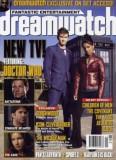
Icon Interview: Clive Barker
By Calum Waddell, Dreamwatch, Issue 145, October 2006 (note - interview took place June 2006)
"Yes, [Weaveworld] is drawn from my own reality. My Irish grandmother, my father's mother, was the inspiration for Mimi, the old lady in the book. She would hide my Christmas presents in this huge old wardrobe and tell me she had hidden them where I would never be able to find them. I would open the wardrobe door and climb into all of this space, with mothballs and dresses... and in the back I would see these parcels that, of course, I wasn't allowed to open, but I was allowed to feel around and try to guess what they were. So right there is Weaveworld... right there in my personal life."
'It's Yours - It Always Was...'
By Phil and Sarah Stokes, 20 October 2006 (note - full text here)
"They're going to remake Hellraiser One with a lot more money and they've invited me to write it - the invitation came from Bob
Weinstein - which I am going to do, on the basis that if I don't do it, it will be done in some way that I probably won't like!
"It's only that one that I really, really, really care about in terms of its remake value - and it'll be kind of fun to have the extra money
to do the effects and all that cool stuff."
Clive Barker Talks New Hellraiser
By Ryan Rotten, Fangoria.com, 23 October 2006 (note: full text online at www.fangoria.com)
"When I'm done with Gospels, I'll begin writing Hellraiser 1 while I'm doing the paintings for Abarat part three.... I just wouldn't be
at peace with myself if I gave this [remake] writing gig to somebody else, and I've always had in the back of my head what I
wanted to do. There are things which are going into the movie which I've had tucked in my brain for years.
"I haven't talked to anybody else [involved in the original] about this. I'm going to write it and see how it goes. I'm hoping Doug
will be back [but] this will be a different Pinhead."
'Hellraiser' Back From Dead
By Stephen Zeitchik, (i) Variety.com, 8 November 2006 (note: full text online at www.variety.com), (ii) Daily Variety, 9 November 2006
"There are some areas of the first movie where I think we can be a lot more intense and a lot more scary... It will not be simply a reworking or reshooting of the first picture."
Barker Pairs With Walden For Poe Thrills
By Nicole Sperling , The Hollywood Reporter, 30 November 2006 (note: full text online at www.hollywoodreporter.com)
"I think we might have a chance with this project to bring the character of Poe alive for a new audience and weave his shadowy existence into the dark enchantments of his stories so that for our protagonist, and for our audience, it will be difficult to be sure where one finishes and the other takes flight."
Pinhead's Progress
By Phil and Sarah Stokes, 15 and 22 December 2006 (note - full text here)
"Liverpool is a city in change, in rapid change in preparation for the European Capital Of Culture event and you can see the
money that's being poured into particularly the inner city: there are cranes everywhere and building everywhere and it's nice to
see my city, which was in a little bit of a doldrums in the '80s, sort of being given a new lease of life. My part in the Capital Of
Culture event is still in development, so it's very hard for me to say very much cogent about it... I've proposed some ideas to them
which have already been accepted...
"I love Liverpool and I always will and I was thinking actually as I've been very tentatively looking at Art 3 and just beginning to
focus my attentions there, knowing that in the next few years I'm going to tackle that - you know that Liverpool obviously has a
significant part to play... in Everville and has another part to play in the third book
and it's interesting: I've got to be careful about this, I've got to make sure I'm describing a city which still exists, given this rapid
transformation...
"Liverpool is sufficiently old a city and has been - perhaps even almost accidentally - careful with some of its older buildings that
I'd like to think, as I say, that people would be able to have Art 3 under their arms and go to a given place and find it there and so
I'm going to make myself familiar in the next few years as I back and forth to Liverpool and develop whatever I'm going to do with
the Capital of Culture stuff that I'm going to make sure I study the city a little bit more closely. There's some very magical
backwaters, particularly actually in central Liverpool; little alleyways which lead onto squares and I've always had, I think, a love of
the secret side of cities."





